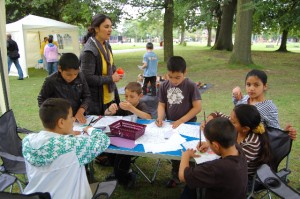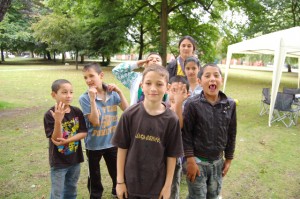For every enterprise that grows through a mixed palette of investment and management support, there is the business thwarted by a seemingly impenetrable wall of investment options. Read my piece on how businesses might attract social investment on the Guardian’s social enterprise network here.
Category Archives: Social enterprise
The cuts – an alternative
For those who’ve not already seen it, this powerful film presents an alternative to the government’s devastating cuts agenda. It features community groups and anti-cuts campaigners along with Bill Nighy, Radiohead’s Ed O’Brien and Zac Goldsmith MP. Worth watching ahead of this weekend’s demo in London against the cuts.
It Cuts Both Ways…The Alternatives from Oonagh Cousins on Vimeo.
Village shops; the tip of the rural social enterprise iceberg
The community-owned and run village shop in the Archers gave rural social enterprises a welcome figurehead but projects in real life provide much more than groceries. Read Saba Salman’s piece on the Guardian social enterprise network site.
Training tomorrow’s social enterprise leaders
There are growing ripples of activity in the social enterprise sector caused by efforts to plug the skills gap and boost the role of continuing professional development (CPD). Click to read my piece for the Guardian’s online social enterprise network.
Sociable mergers; social enterprise collaboration
Several high-profile social enterprises are merging, but how troublesome are the tie-ups? Here’s my Guardian online piece on social enterprise mergers.
Young people and a load of bull
Kayla Whiting lives in Hackney, a former administrator for media social enterprise Poached Creative, she project managed the short community film Life’s A Bitch which got local young people involved in media and raised awareness about Staffordshire Bull Terriers. Here, she explains how and why she did it.

I did the film because … I wanted to defend the breed of dog and get people in the community to think before they stereotyped the dog and also give the young people an opportunity to learn valuable media skills.
My aim was…to produce a piece of footage that would change people perception on Staffordshire Bull Terriers.
The hardest thing was…keeping the young people engaged with the project and taking responsibility of all the paper work.
The most rewarding thing was…knowing all the young people enjoyed the experience and learnt new skills; which helped them back into training.
I funded it by…applying for funding from funding body Mediabox with the help of Poached Creative and youth-led media group Mediorite.
My tips for others wanting to do the same are…to keep the work as practical as possible. Make sure you create a strong bond with your team.
The biggest problem for communities today is…young people not being able to get jobs and progress in fields they would like.
If I could have a word in David Cameron’s ear I’d… tell him to make politics more understandable and engaging.
My inspiration is… being a young person myself. Being able to help other young people and help them to work towards their dreams as I am.
In 10 years time I want to be…a millionaire!
How Roma integration could be child’s play
It is a simple act that speaks volumes about the barriers that have been broken; a young Roma boy hands a flower to the play worker he had been so challenging towards just two weeks ago.
The scene took place in August at a groundbreaking playscheme run by social enterprise the Big Life group which encouraged Roma children aged 7-11 to mix with their local Manchester counterparts.
As Europe’s largest ethnic minority, the 12m-strong Roma population might be dispersed across the EU, but it is unified in the discrimination routinely faced by its people. From being moved on from traveller sites to outright repatriation, Roma families live in poverty and are reluctant to contact statuary services fear being moved on or suffer harassment.
Negative perceptions of the Roma community in Manchester along with an increase in the number of Roma people wanting to sell The Big Issue in the North led to the launch of the Big Life group summer play scheme (Big Life owns the Big Issue in the North). Open to all children living in the Longsight area of Manchester, it aimed to break down barriers between the communities and reduce the perceived or actual nuisance behaviour over the summer.
The scheme was publicised through leaflets given out during the social enterprise’s family support sessions and through local children’s centres. Word of mouth also encouraged Roma children to access the project.

The scheme, jointly funded by Manchester city council and The Big Issue in the North Trust, did not charge participants and 60 children registered across the month-long scheme with a total of 30 per session. Take up was even; 52 % Roma registrations and 48% from other communities.
Project leader Daniel Achim recalls that the scheme got off to a shaky start: “At the beginning all children seemed to be rather slow to action the requests of the play workers. The children were testing the boundaries and the workers had to repeat the same information over and over again in order to get a result.”
Yet, as Achim says, by the end of the playscheme there was a major transformation in the behaviour of the children in terms of respect and politeness to staff. “In a safe and welcoming environment where they were not discriminated against children learned to relax around each other, they learned to share play equipment, they learned to wait their turn.”

While entrenched attitudes towards those who are different can be hard to shatter, the Big Life playscheme shows how to break down barriers through play. Any mutual suspicion was soon overcome. Encouraging integration through play and from an early age is starting to reap rewards.
As Achim says, often the tensions tended to be between children from the same backgrounds: “Sometimes it is easy to see differences between communities – when really it is just kids being kids.”
Is social enterprise a magic wand?
See the Guardian’s new social enterprise network for my piece on social enterprise as a magic wand: The challenge facing social enterprise, warned Peter Holbrook, chief executive of umbrella group the Social Enterprise Coalition, before the election, “is to be vigilant to ensure that the discourse on social enterprise is not distorted by the next government’s ambitions and policies around it.”
Shades, strut and soul; a universal arts experience
Rapper Dean Rodney has a soulful strut, a powerful pair of lungs and a learning disability. Dark shades, smooth black suit, definitely supercool. I’ll be at the Royal Festival Hall on London’s South Bank tonight to see his band, the Fish Police, a fired-up trio that fuses hip hop with funk and punk and lists Japanese anime and fast food among its eclectic inspirations.
Fish Police met when musician and lyricist Charles Stuart trained two learning disabled youngsters, Dean (now Fish Police singer, rapper, bass and lyrics) and Matthew Howe (the trio’s equally cool rhythm guitarist) as part of a youth band based at disability arts organisation Heart n Soul.
Next month the Fish Police will be releasing their debut album, Cheeseburger Man (Herbie Hancock’s Watermelon Man for the McDonald’s generation?), performing at the Lincoln Center in New York and at Liverpool’s DaDa Fest, the UK’s largest disability and deaf arts festival. Their music is a fresh and freestyling antidote to the conveyor-belt fodder jostling for space in today’s uninspiringly plastic charts.
I came across Heart n Soul over a year ago when I heard about one of its artists, soul singer Lizzie Emeh. Lizzie broke new ground by becoming what’s thought to be the first learning disabled solo artist to release an album to the general public. Loud and Proud was three years in the making and produced with the support of Heart n Soul, 33 years after Lizzie’s parents were told never she would never walk or talk following complications at birth.
In 1984, musician Mark Williams (now Heart n Soul’s director) wanted to explore how music and art could make a difference in communities. He began running creative sessions in east London for a group of people with learning disabilities who went to the local day centre, The Mulberry Centre. Eventually The Mulberry Crew, as they came to be known, moved into a bigger arts complex in Deptford and became Heart n Soul, with the aim of working towards professional productions – not simply, as was then the norm, undergoing art therapy.
The charity now runs a hugely popular club night for people with learning disabilities, the Beautiful Octopus club, and has a consultancy arm to advise other organisations on setting up cultural events for those with special needs. It also employs people with a learning disability and markets arts events to the learning disabled.
The Fish Police, Lizzie Emeh and their other talented peers are also regulars at Heart n Soul’s summer arts festival which is based on the Beautiful Octopus club night. The event isn’t on most people’s summer festival radars, but it should be. Along with live music, the event a couple of months ago boasted a comedy stage, improv and open mic sessions, face painting, a massage tent, a chill out zone designed by the Brockley Jack Studio Theatre, cinema room, dance floor and VJs and DJs. Performance art is notoriously hard to pull off, but the trio of artists performing as Live Heart did so with panache, demonstrating why the Tate Modern recently invited them to perform. K:DNA showed off their inspired blend of funk, reggae and classical music while the Riki Jodelko Band were an amazingly tight soul-pop outfit, astounding when they covered Bill Withers’ Lovely Day and Bob Marley’s Could You Be Loved.
Best of all, I loved the inclusive nature of the event. The Beautiful Octopus invites everyone to have a good time, regardless of ability or special need. When you enter the world of Heart n Soul’s festivals or club nights, when you immerse yourself in the melee of fancy dress, fairy wings and face paints, when someone in a clown outfit tumbles head over heels into a perfect cartwheel right in front of you, whether they have a learning disability or not is irrelevant – what’s important is that they’re having fun. And it’s infectious.
Frankly, in this environment (compared to other events I’ve blogged about) it’s impossible not to roll with the good times. I’m working on my cartwheel for next summer…for tonight, the shades and soulful strut will have to do.
* The Beautiful Octopus Club is at the Royal Festival Hall, Southbank Centre, tonight (Friday 8 Oct) 7pm-12am. Entry is free.
The tale of Lion Face: how businesses could help society
The story of Lion Face puts the big into big society. Seven years ago, the 20-year-old gang member from the barrios of Aragua, Venezuela, mugged a security guard from the nearby Santa Teresa rum distillery and stole his gun. When Santa Teresa’s security boss caught him a week later, Lion Face was given a daring ultimatum by the company’s wealthy owner, Alberto Vollmer.
In a move worthy of modern folklore, Vollmer said Lion Face could work for him for three months without pay, or be handed over to the police. It was a risky proposition, but a week later, Lion Face came back – accompanied by around 20 fellow gang members who also wanted to work. Vollmer agreed and Project Alcatraz, as it’s now called, was born (the name reflects the idea that people’s worst prison is themselves and the challenge is to escape from themselves).
The project aims to reduce delinquency and unemployment and involves gang members in an intensive (and mildly eccentric) three-month work-study programme that include rugby training and community service. On completion, participants choose between a formal job – in the Café Alcatraz programme, for example, they learn how coffee is produced and packaged- or further education, perhaps via the on-site housing construction workshop.
Santa Teresa, a 200-year-old family run company, is some 4,500 miles from Westminster, but given the current debate about the private sector’s role in big society – and if big society includes encouraging something other than statutory services to tackle social problems – the tale of Lion Face is a salutary one.

Since 2003, five gangs have completed the project and been disarmed. Local crime has fallen by 40% and last year Project Alcatraz won best social inclusion project at the Beyond Sport Summit to celebrate sport-led social change in London. Professor James Austin of Harvard Business School’s Social Enterprise Initiative has said of the management of Santa Teresa that “its viability and profitability are dependent not only on its ability to produce a superior product, but also to generate social value for its surrounding community”.
And that’s not all, several years ago Vollmer negotiated with squatters who wanted to take over land on his sprawling estate; the result was the creation of Camino Real, a 60-acre 100-house community built by the squatters themselves and funded with government housing agency mortgages.
While most large UK businesses have corporate social responsibility (CSR) programmes that include employee volunteering schemes and donations to local schools or community projects, the ethos and scale of what’s going on at Santa Teresa is closer to the now extinct philanthropic traditions of Quaker companies (think Cadbury, Rowntree, Frys). Vollmer’s philosophy is quite simply that healthy communities lead to healthier profits. As Vollmer himself has said: “If you have growth and well being in the company but not in the community, then you are dead meat.”
Santa Teresa invests about 2% of its profits in social projects and attracts money from other sources including charitable donors. No mean feat given the years of political and social upheaval under President Hugo Chavez’s divisive regime that has pitted poor against rich.
It’s crude to suggest that Project Alcatraz can be replicated elsewhere; the schemes are as much a product of Venezula’s unique political, social and economic context as they are the result of the single-minded determination and social awareness of Santa Teresa’s owner. The best social businesses owe as much to their visionary and determined leaders as to their watertight business strategies and savvy investors, but the Lion Face story shows what is possible when business puts its money where its manpower is.
On a smaller scale, as discussions at a Tory conference fringe meeting today should reveal, there is some evidence that US-style Business Improvement Districts (BIDS) might help plug the gap left by public sector cuts. BIDS are defined areas within which businesses vote to invest collectively in local improvements (and therefore boost their trading environment). The public-private partnership between the local authority and business are funded by a levy on the business rate charged by the council.
Birmingham, for example, has three BIDs which collectively generate around £2m of private sector investment into city centre public areas each year. Birmingham’s BIDs certainly seem successful, winning national plaudits for their nighttime economy and the cleanliness of the city centre streets. Crime figures in the Broad Street BID area, for example, have been dented since the launch of the scheme, from 1,300 incidents in 2005-6 to 995 in 2008-9 and public satisfaction is high.
However, not all BIDs are proving entirely successful, as Edinburgh has found to its peril. Business organisations might be reluctant to participate thanks to the same economic malaise that is leading their statutory sector counterparts to consider retreating from service delivery.
And, given it’s taken five years to get 100 BIDs up and running around the country, how long it will take for the city centre programmes to make large-scale improvements (more to the point, will it be only a handful of BIDs that go beyond the realm of cleaning pavements, erecting floral displays and installing Christmas lights?). Also, as I remember from reporting about West End BIDS 15 years ago when the schemes were being chewed over by a clutch of the capital’s boroughs, there’s a worry about displacement. If improvements stop at the BID boundary isn’t there a danger of creating a two-tier city centre with a clean core and sweeping (literally, in many cases) the problems to the edge of the BID area?
As the public sector cuts back on delivery and all eyes dart desperately towards the twin panaceas of social enterprise and the voluntary sector to adopt its mantle, businesses and business-led partnerships should wake up to the vested interests they have in their local communities. Maybe that’s something to be championed by the new breed of City mayors recently proposed by Communities and Local Government Secretary Eric Pickles?
The UK has enough Lion Faces. Now what we need are a few more Vollmers.
* A fringe event ‘What role can Business Improvement Districts play in the recovery?’ takes place at 5.45pm today at The Mailbox centre, organised by Birmingham CIty Centre Partnership. Speakers include Bob Neill MP, Parliamentary Under Secretary of State for Communities and Local Government and the Broad Street BID’s Gary Taylor.
